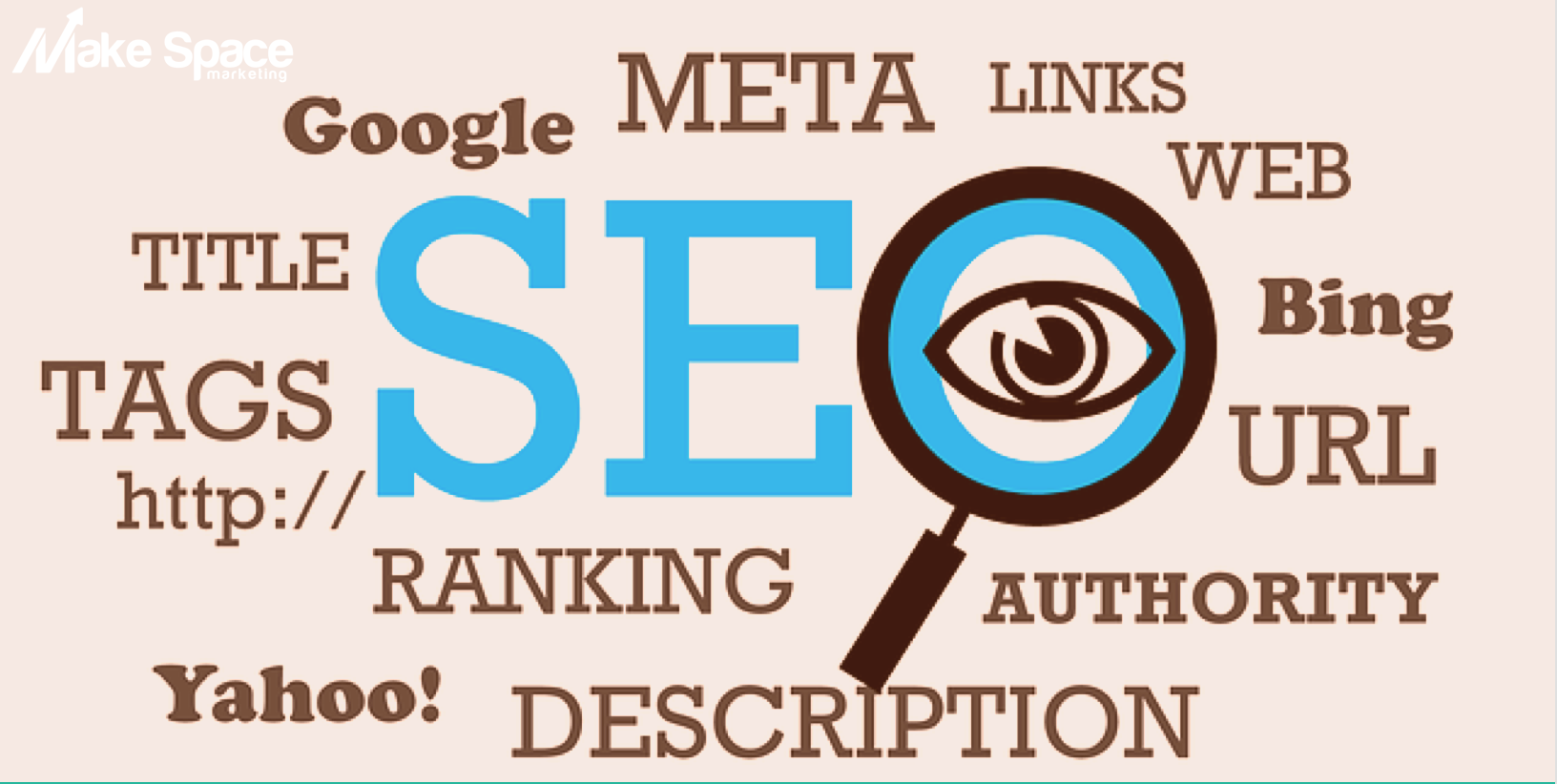SEO Strategies for Small Businesses
SEO Strategies for Small Businesses
Learn the Basic SEO Strategies for Small Businesses
The growth of small businesses is highly dependent on the online presence and the ability to reach a larger audience. Search Engine Optimisation (SEO) is vital to reaching that target audience and ranking higher in search engines. In this blog, we will discuss the best SEO strategies for small businesses to boost their online presence and reach the target audience.

You may have a limited marketing budget if you run a small business. However, getting online and ranking well in local search results is essential for increasing sales of your products and services. But where do you start? If you're unfamiliar with SEO, the acronym stands for Search Engine Optimisation. In this blog, Make Space Marketing will share some handy tips on optimising your website so that people searching in your area will find your business.
What is SEO?

SEO (Search Engine Optimisation) is optimising your website to rank higher in search engines. It's a long-term strategy that requires patience and consistency but can also be gratifying and successful.
SEO aims to help people find your business when looking for products and services like your business offers. With good SEO practices, your website will appear at the top of search engine pages (SERPs) when someone searches for a keyword that is related to what you do or sell. This will help drive traffic to your site from potential customers who may have otherwise have never found out about you had it not been for their search engine query.
On-page Optimisation
On-page optimisation involves optimising individual web pages to rank higher to attract traffic in the form of potential customers in search engines. This includes optimising the page title, meta description, header tags, and content. There are several things that you can do to influence the quality of your content which will increase rankings and lead to more orders.
Content Marketing
Quality content is the foundation of any successful SEO strategy. Creating valuable and engaging content can attract and retain a large audience, boost brand awareness and drive traffic to your website. Focus on creating useful and relevant helpful content for your target audience.
You can do this quite effectively through blogging about the products and services that you offer. The great thing about blogging is that it provides you with an excellent opportunity for organically getting keywords onto your website. Moreover, good content will greatly enhance your SEO rankings by keeping your bounce rate low, which is one of Google's ranking factors.
The Importance of Keywords

Keywords are the words you use to describe your business. They're also crucial for SEO, online marketing, and local search engine results pages (SERPs). To optimise your content, you need to identify the most important words and phrases used in searches related to the topics you're writing about. To do this, consider using a keyword research tool such as Google's Keyword Planner or Answer The Public. These tools can provide insight into the competition for your chosen keywords and show you related terms and topics to include in your content to create an effective SEO strategy.
Technical SEO
Technical SEO refers to the optimisation of a your website to improve its rankings by improving the technical performance in order to rank higher in searc engines. This includes optimising the website’s structure, URLs, and loading speed to make it more search engine friendly. The technical elements of SEO are where experts are required for the best results.
Research Your Competitors

Analysing your competitors' SEO efforts can provide helpful insights you can use in your strategy. Many tools are available to facilitate this research from providers such as Ubersuggest or SEMRUSH. Check out your competitor's websites to see the long-tail keywords they're targeting and how they've optimised their content for search engine rankings. You can also review the backlinks pointing to their website to get an idea of which websites are linking to them and how strong those links are. Additionally, looking at the source code of a competitor's website may reveal hidden elements like meta tags or any other hints about the types of keywords they're targeting.
Write SEO-Friendly Content

SEO-friendly content is essential for driving organic traffic to your website. Aim to create informative, keyword-rich content that incorporates the long-tail keywords you researched from a keyword tool. Concentrate on writing relevant, helpful content that solves user problems rather than pushing sales. Ensure you include internal and external links as part of your content. Use appropriate headings and subheadings to break the text into more readable chunks. Optimise images, videos, and other media types to improve user experience and match keyword search intent as best you can.
Improve Your Website's User Experience and Site Structure

Improving your website's user experience and structure can have a significant positive impact on your SEO rankings. Make sure your site is easy to navigate, and use white space effectively to make the layout look clean and inviting. Improve page loading time by optimising images, compressing files, and minifying code. Structure your website in an organised hierarchy so search engines can identify what content you offer quickly and accurately. Utilising a flat navigational structure will also help keep users engaged with more pages of your website and boost your SEO rankings.
Monitor Your SEO Performance and Update Strategies Accordingly

Analysing the performance of your website is essential to understanding which SEO strategies are working and which need improvement. Keep an eye on your web analytics to understand how users interact with your site and determine which pages receive the most visits and conversions. It's essential to keep up-to-date with current SEO trends to stay ahead of the competition, create content for new topics, and fine-tune existing content that's no longer relevant. A strong SEO strategy requires consistent effort and frequent adjustments to succeed.
Understand Local Ranking Factors

Local ranking factors are different from general ranking factors. They are based on your business name, address and phone number, hours of operation, reviews and ratings and telephone calls. Local SEO is vital because it gives you a chance to rank higher in local search results than if you were competing with other businesses nationwide. If someone searches for "roof cleaning" in their city or town, they'll see all the roof cleaners who are nearby first. Companies that provide roof cleaning services in different counties or further away will likely not appear in the search results.
Use Long-tail Keywords

Long-tail keywords are longer, more specific and more relevant to your business and customers. They're often easier to rank for than broad terms because they have less competition. Using long tail keywords is more relevant and easier to rank for. For example, you could target Business Coaching Norwich instead of targeting Business Coaching. Long-tail keywords like the above example can also help you attract more targeted traffic by giving searchers exactly what they want: the perfect match for their search query. You should see an increase in conversion rates when you use long-tail keywords because of their relevance to what searchers are looking for.
The Importance of Page Speed and Mobile Friendliness

You may have heard of page speed and mobile-friendliness as two critical factors for SEO. They are also vital to user experience and essential to any business's success. In this section, we'll look at what these terms mean and how they affect your website's search engine rankings.
By now, you know that Google uses over 200 signals when ranking websites in their search results pages (SERPs). Some of these signals include keyword usage, content length/quality and social media engagement metrics such as shares or comments on articles published on your site. However, other factors influence where your pages appear in SERPs, one being page speed.
Google My Business Optimisation

Google My Business is free to help you manage and promote your business on Google. It's an integral part of local SEO because it allows users to find businesses locally and is an opportunity to show off your products, services and reviews for free. Optimising your Google My Business listing can help you rank locally in the map pack, leading to increased website visitors and more orders for your company.
Conclusion
SEO is an excellent way for small businesses to get more exposure online, which can increase sales. If you need more resources or do not have time to do this work internally, consider using an SEO expert like Make Space Marketing. We have vast experience in ranking small businesses on Google, furthermore, we practice what we preach, and that is how you found us in the first place. We rank number one for SEO in Norfolk. If you want more customers, contact us for competitively priced SEO expertise.
If you want to do your SEO, plenty of free tools can help you optimise your website for search engines like Google or Bing. In addition, using long-tail keywords can help boost your rankings on these platforms and make them more likely to be visible in the rankings when someone searches nearby businesses they want to visit on their mobile phone.




